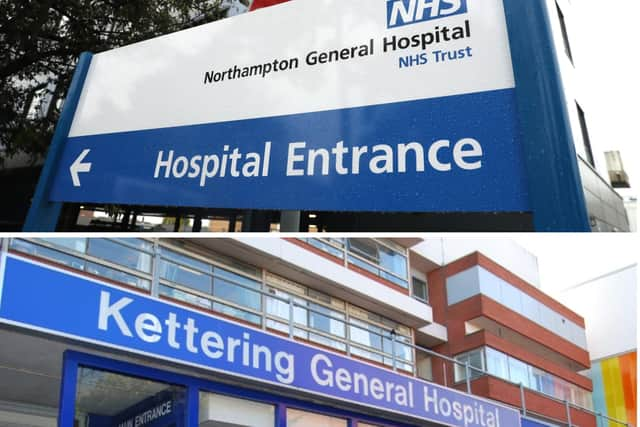NHS figures reveal more than 200 ‘bed blockers’ a day kept waiting to be discharged from Northampton General Hospital and Kettering General Hospital
and live on Freeview channel 276
More than 200 'bed blockers' were waiting to be discharged from Northamptonshire’s two main NHS hospitals every day on average last month, new figures show.
NHS England figuresidentified more than 15 percent of the 1,400 beds at Northampton General Hospital and Kettering General Hospital which could be ready for new patients — but nearly a third of those ready to be discharged must stay in because of pressure on the social care system outside. Average numbers of delayed discharges in England reached a new high last month, including 146 people per day ready to be discharged at NGH in October – although this was down from 166 the month before — and 66 per day at KGH, up from 52 the month before.
Advertisement
Hide AdAdvertisement
Hide AdThe Department for Health and Social Care recently announced that an additional £500 million would be spent on speeding up the release of patients from hospital but health think tank the King's Fund said this is not sufficient to deal with the problem. Across the country, the average number of occupied beds has risen consistently since the summer, from 11,590 per day in June to 13,305 in September and 13,613 last month — the highest monthly figure since comparable data began in December 2021.


David Maguire, senior analyst at the King's Fund, said the problem is “another chapter in an ongoing story” as the NHS continues to deal with post-coronavirus pandemic pressures and stretched budgets.
He said: “It’s not crept up on anyone and is a continuation of the pressures we have seen on social care over several years. The sector is hitting a tipping point.”
Mr Maguire explained that social care services have been cut due to reduced funding for local authorities, meaning many patients are waiting in hospitals for adequate care packages to be installed, such as home adaptions, places in care homes or community health support. The difficulty of recruiting and retaining staff in the adult social care sector was also raised as a key issue.
Advertisement
Hide AdAdvertisement
Hide AdNationally, just 40 percent of hospital patients were discharged when they were ready in October. At KGH the figure was 47 percent – down from 56 percent in September — but 28 percent at NGH.
Miriam Deakin, director of policy and strategy at NHS Providers, the membership organisation for NHS trusts, said: “Nobody in the NHS wants people to be kept waiting but pressure on social care and community services means that hospitals struggle to discharge people who’re well enough to leave.
“To ease pressure on the NHS, the Government must act now to fix chronic staff shortages and an underfunded social care system.”
Chancellor Jeremy Hunt’s autumn statement announced an extra £2.7 billion would be invested in adult social care services over the next two years in a bid to reduce bed blocking, alongside the £500 million discharge fund.
Advertisement
Hide AdAdvertisement
Hide AdSome £200 million of the discharge fund is allocated to local authorities to bolster the social care workforce while £300 million will be given to integrated care boards, which have replaced clinical commissioning groups.
Care minister Helen Whately said: “The discharge fund will get more people cared for in the right place at the right time.”
